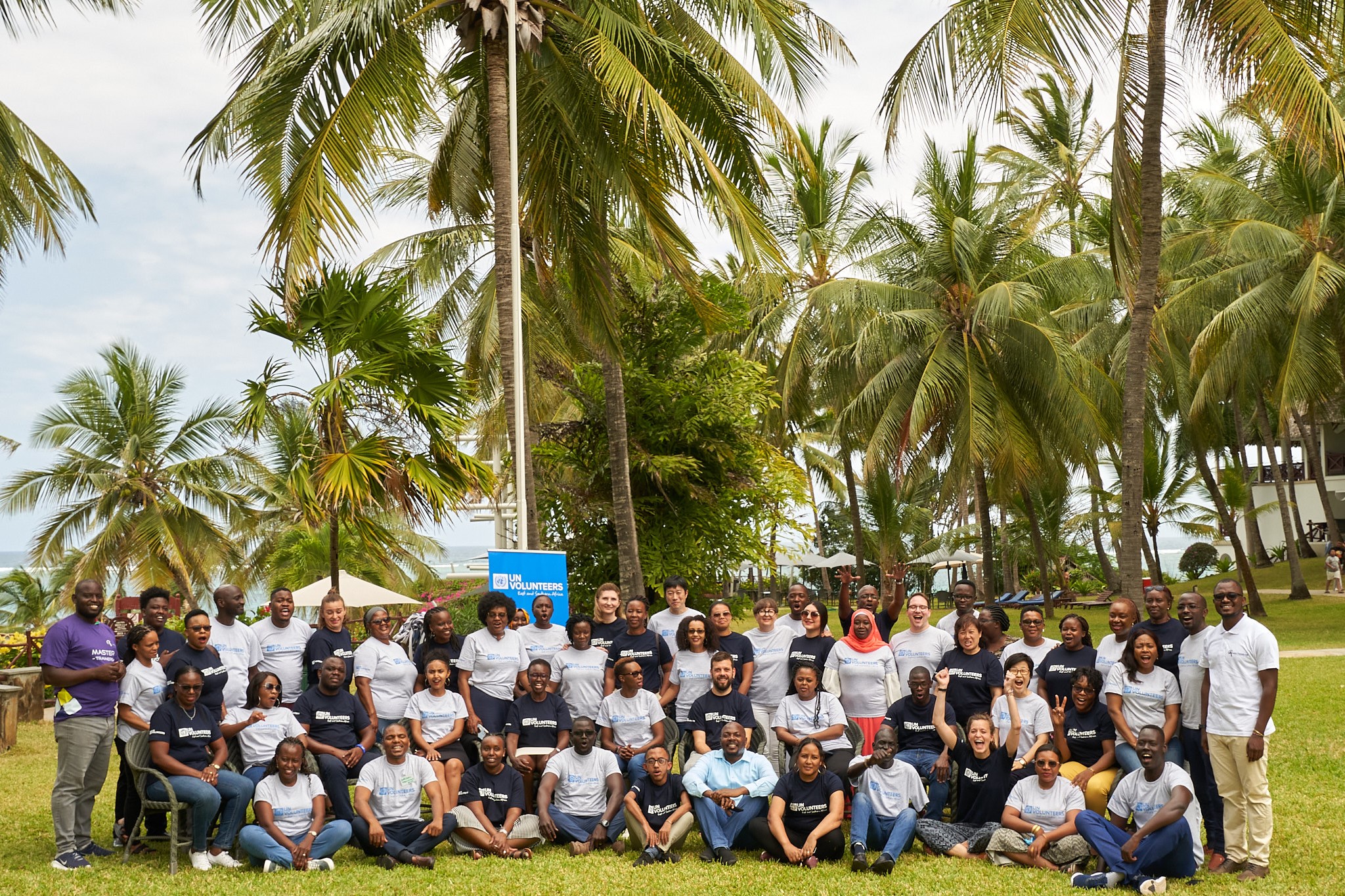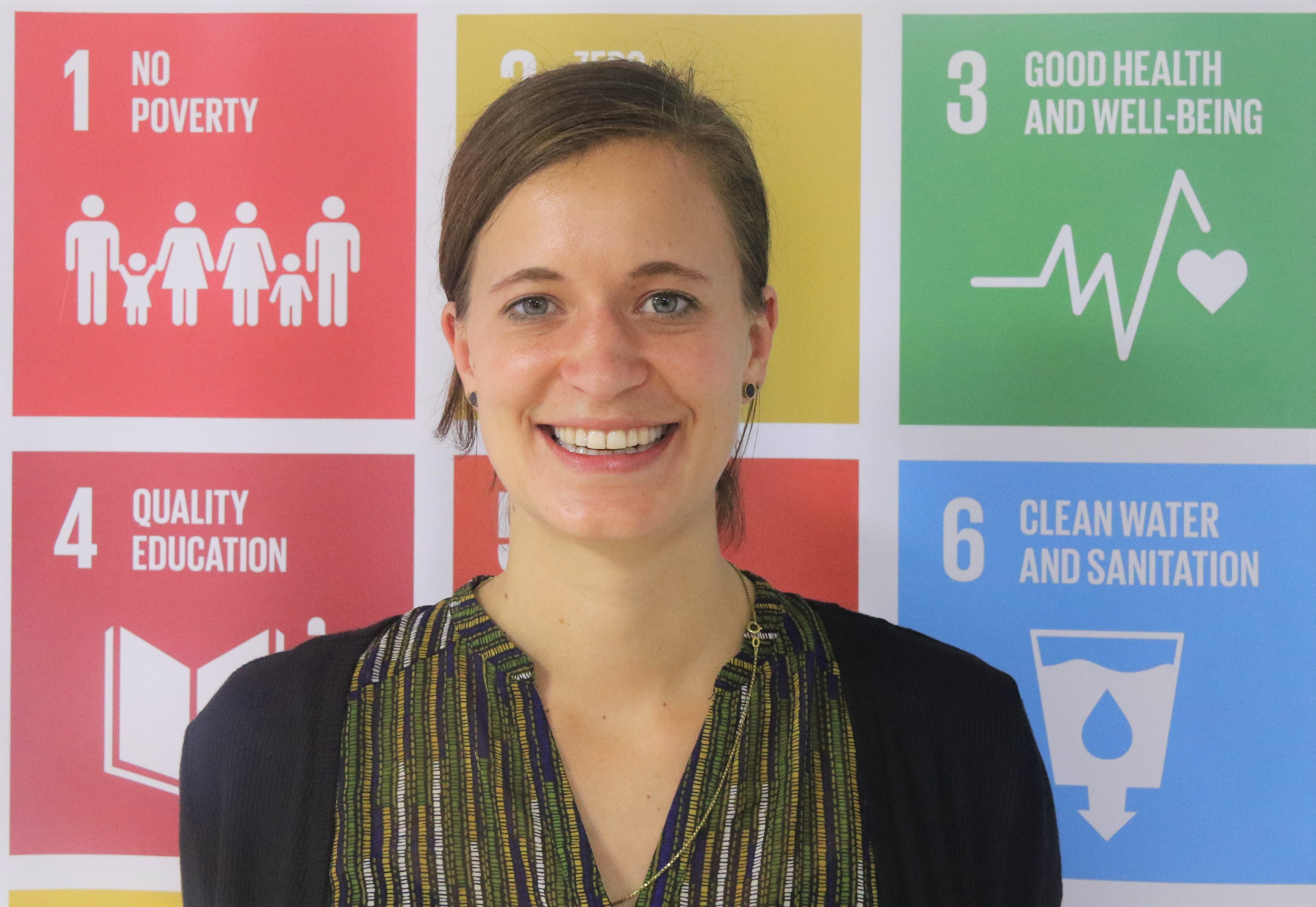JPO Story - Johanna Dohl
April 4, 2023

Johanna Dohl (third from the right at the bottom) at a UNV retreat in Mumbasa, Kenya in October 2022.
What is your educational background?
My educational background is an interdisciplinary one: I hold an Erasmus Mundus MA in “Euroculture: Society, Politics and Culture in a Global Context” from the University of Göttingen (Germany)/the University of Deusto (Spain) as well as a Franco-German BA in “Intercultural European and American Studies/Langues étrangères appliquées" from Martin-Luther University Halle-Wittenberg (Germany)/ Paris Nanterre University (France).
What made you apply to the JPO programme/what is your motivation to work with your UN agency?
I started my UN journey in 2017 as a Carlo-Schmid-Fellow, working for 6 months for the UNV NY Office. Back then, I had an amazing experience, being part of a small and enthusiastic team and exploring the UN in New York City. During my time as a fellow, I met four female, extremely qualified and very motivated UN Volunteers and I was just amazed how well they supported their respective teams. This was one of the reasons why I applied for the JPO programme in 2021. In addition, I think that the UNV programme is special in the UN system: In 2022, more than 12.000 UN Volunteers supported 55 different UN entities in more than 166 countries of assignment. The majority of UN Volunteers were national UN Volunteers, coming from the Global South and most of the UN Volunteers were female. Unfortunately, these numbers cannot show the individual impact, commitment, and motivation that each of the UN Volunteers bring to the UN system overall. But what motivates me to work with the UNV programme every day is to know that these UN Volunteers are an amazing gift for the whole UN. Apart from the fact that I am professionally enthusiastic about volunteerism, I am also passionate about it on a personal level: Since my own voluntary service in India from 2011-2012, I have learned how much a voluntary service can change your perspective on the world and how much you can grow as an individual. I wish this was something which would be possible for all people around the world to become global citizens.

Johanna Dohl, Programme Analyst Regional Partnership and Knowledge Management UNV Regional Office for East and Southern Africa
What are the main activities/tasks you are working on? What is a day at the office/in the field like?
In my current position, I work on regional partnerships and knowledge management in our UNV Regional Office in East and Southern Africa in Nairobi, Kenya. My main activities evolve around partnership engagement with other UN entities which work in our region. Each Regional Office/Bureau covers different countries and has a unique priorities. In my current role, I have meetings with focal points from other UN entities where we discuss capacity-needs of our partners and opportunities for UN Volunteers to support their work. Sometimes the capacity needs are related to specific job fields which are urgently required, sometimes they are more related to different diversity aspects and sometimes the focus on specific countries in the region. Hence, every partnership engagement is very different. However, the feedback from our partners is that they highly appreciate the contribution of UN Volunteers to their teams – which is also a daily motivation for my own work.
In your day-to-day work, what SDG(s) are you helping to implement?
The 2020 Agenda for Sustainable Development explicitly recognizes volunteer groups as stakeholders to achieve the 17 SDGs and since volunteerism is a cross-cutting topic, it also concerns all 17 SDGs. Even if I am not working on all 17 SDGs in my day-to-day work, I strategically try to support the deployment of UN Volunteers to different UN entities, working on different SDGs. However, on a personal level I would say that I try to emphasize the importance of SDG 5 on gender equality in all partnership engagements since gender diversity is not only an important issue for UN Volunteers, but for the UN system overall.
What is the most challenging project that you have worked on/are working on?
One of the most challenging projects was to go on mission to Juba (South Sudan) with our Deputy Executive Director Kyoko Yokusuka and my Regional Manager Lucy Ndungu. During the mission, we had different partnership meetings with focal points from UNMISS as well as different focal points from Agencies, Funds and Programmes. For me, the mission itself was not the challenging part, but rather to learn about challenging realities which South Sudan is facing as a country and getting to know the work conditions of UN colleagues and especially UN Volunteers. During a townhall meeting with our UN Volunteers in South Sudan, I was just amazed how committed all of them are towards their work. I was especially impressed to see female UN Volunteers working in very challenging contexts. This is something I highly admire and appreciate and which I would find extremely difficult for myself.
What has been the most rewarding experience to date for you at your duty station? (work and/or non-work related)
One of the most rewarding experiences was the development and implementation of an online workshop series called “Understanding Diversity, Equity and Inclusion (DEI) for UN Volunteers in East and Southern Africa”. This is a workshop I jointly organized with different colleagues in the UNV HQ in Bonn, UNV ESARO and with external consultants to discuss DEI topics with UN Volunteers. After the workshop, various UN Volunteers approached me on an individual level to thank me and my colleagues for making this learning opportunity possible for them. This is something which I find highly rewarding since a personal note of appreciation generally means a lot to me.
What set of skills have you developed most throughout your assignment?
I would say that I have developed stronger transcultural skills, client management skills and analytical skills. In my position, it is crucial that I am a people person (which I was before already). However, before partnership meetings I always need to analyze the needs of the partner entity and working on partnerships also means that you need to build trust and a strong working relationship with your respective focal point. All partnerships I work on are different, such as the focal points I work with. Therefore, it is also essential to be flexible to respond to the respective partners’ priorities and needs.
What piece of advice would you give to those who are considering applying to the JPO Programme?
Personally, I think that the JPO program is a huge privilege and being part of it is something I would have never dreamed of when I was younger. In my family, me and my sister were the first ones who studied, and I was also the first one in my family who went abroad and who speaks different languages fluently. I consider studying, living, and working abroad a great opportunity, but I am also aware that the JPO programme is not available for citizens in all countries. During the last ten years, my family supported me and I had different friends, mentors and supervisors who always encouraged me to reach for the stars. And this is also what I would recommend to everyone else who would like to apply for the JPO programme or a UN position in general: Don´t underestimate yourself – that´s probably what others do already. Try to apply as often as possible for different positions, seeking support from people you trust and believe in yourself. Eventually, you will shine!
How do you feel your JPO assignment will influence your career choices/opportunities within the UN?
I strongly believe that the JPO assignment is one of the best opportunities to start a career within the UN since you grow both professionally and personally. In my current position, I work with different UNV colleagues around the globe, with focal points from different UN entities in the region and through various missions, I have learned about different country-realities here in the region. This exposure has been very important for me, and it might pave the way for a career in the UN after my JPO programme. However, I also feel it is important to recognize that the programme itself is a huge privilege and for me, this also means that I try to encourage and support other colleagues in my sphere of influence. Hence, the JPO programme is not only a great opportunity, but it comes with responsibilities towards others who might not be as lucky to be funded by a donor government.
Do you feel that you are part of a community of purpose?
Since the UNV programme is – in the overall UN context – rather small, I feel part of a big UNV family (as we call it internally). I appreciate that I can easily reach out to colleagues around the globe and that I feel the passion for volunteerism across the organization. However, I have also worked with different UNDP colleagues here in Kenya and in other duty stations and this has also been a great experience. Officially, I work for UNV, but I feel that I belong to both UNV and UNDP as a community which tries to improve the world – sometimes against all odds.
What is the biggest motivator for you when it comes to your work?
Personally, my biggest motivator when it comes to work is the diversity of UN Volunteers. Whenever I am in a call, in a meeting, on a mission or just having lunch: It happens very often that I meet UN Volunteers and I just find it so special what everyone brings to the UN system. In my team, I am very lucky because I work with different UN Volunteers. So, I feel that I know every day why I find my work so important. There are also quite many success stories of UN Volunteers who managed to enter the UN system after their voluntary service. This is something I am very passionate about as it makes the UN overall much more diverse – and this keeps me going!
In what ways do you feel you are part of an organization that fosters people’s development?
For the UNV programme, learning and development is an integral part of UN Volunteer´s assignments – and I would say this is similar for UNV and UNDP staff in general. As a JPO, I am in the special position that learning, and career development are also part of the program. So, I feel that I have various learning opportunities already. But of course, it is also important to underline that the UN should encourage live-long learning for all its personnel – no matter what the contract modality is.
I never thought that I would work for the UNV programme in Nairobi in Kenya – but it happened. On a personal level, it is an experience which helped me to grow, to learn Kiswahili and to get to know beautiful Kenya and the welcoming attitude of Kenyan people. On a professional level, the programme is a great opportunity to expand my professional network, to learn more about the work of the UN in East and Southern Africa and to be part of the overall UNV family. So, I think it´s probably one of the greatest learning opportunities in my life!Johanna Dohl

 Locations
Locations


